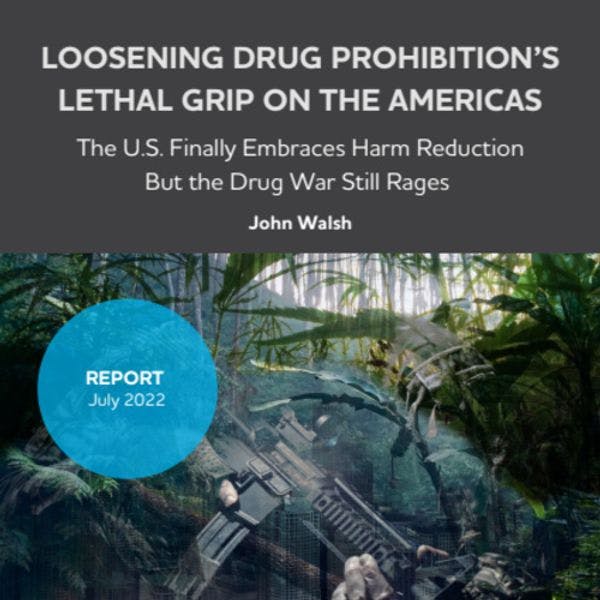Desserrer l'emprise mortelle de la prohibition des drogues sur les Amériques : Les États-Unis adoptent enfin la réduction des risques, mais la « guerre à la drogue » fait toujours rage
WOLA met en lumière les dommages causés par la « guerre à la drogue » menée par les États-Unis en Amérique latine et sur son territoire, et appelle à une transition vers une réglementation qui protège les droits humains et favorise la santé, l'égalité de genre et « raciale », la sécurité et la durabilité environnementale. Pour en savoir plus, en anglais, veuillez lire les informations ci-dessous.
More than half a century after the advent of a global drug prohibition regime and the launch of the U.S. “war on drugs,” the results have been disastrous for Latin America and the Caribbean, and for the United States itself. Even worse, prohibition’s consequences are exacerbating other grave problems—corruption and organized crime, violence perpetrated with impunity, forest loss and climate change, and displacement and migration—making solutions to these challenges even more difficult to achieve. The Biden administration’s historic embrace of harm reduction represents an enormous, lifesaving advance for U.S. drug policy. But even with harm reduction services, moves to decriminalize drug possession, and shifts underway to legally regulate recreational cannabis, the brunt of drug prohibition remains intact and the drug war rages on in the Americas. The principal victims of government repression in the name of drug control and of the predations of organized crime have always been and continue to be the most impoverished and marginalized communities. At the same time, the illegal drug trade constitutes an economic survival strategy for millions of people in Latin America and around the world—a de facto social safety net of the sort that national elites and governments themselves have proven unwilling or incapable of providing.
Having put down deep roots over the decades—ideologically, politically, bureaucratically and even culturally—prohibition can seem impervious to reform. However, the current regime was not inevitable but rather the product of a certain historical moment, and need not endure forever. Recognizing that prohibition is in fact a policy choice, not an immutable condition, should encourage civil society and lawmakers to undertake the serious deliberations, debates and analyses that will be required to transition to better drug policy choices oriented toward legal regulation, harm reduction, and decriminalization. The rationale for transitioning to regulation is not that drugs are safe, but that drug use poses a range of risks and that governments should apply their regulatory tools to manage those risks to protect public health and safety. Regulatory models must prioritize the interests and inclusion of those communities most harmed by the punitive enforcement of drug prohibition. Such regulatory frameworks will be far better suited than prohibition to protecting human rights and promoting health, gender and racial equality, security and environmental sustainability.
